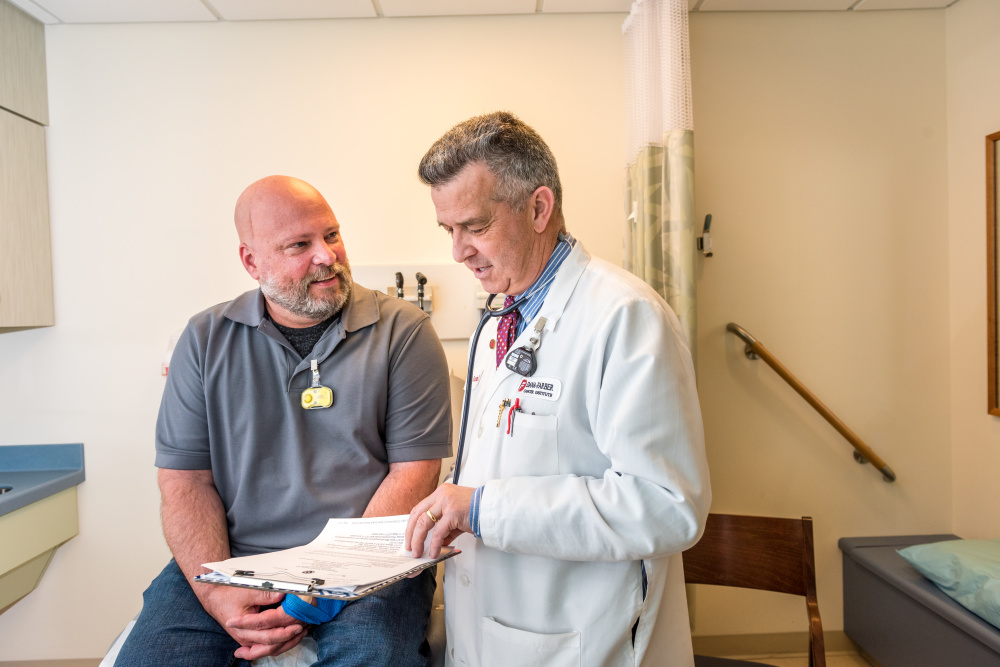It’s 19 months after being diagnosed with the aggressive brain tumor, glioblastoma, and Andrew Wall is itching to go back to work as a police officer. “Sitting around is not my thing,” says Wall, 53, who hasn’t yet been cleared to return to work as a police officer in Monroe, Connecticut – a job he has held for 22 years. But Wall, who lives in Newtown, Connecticut, is upbeat: “This is gifted time as far as I’m concerned,” he says.
Read More:
Remarkably, Wall has had his tumor held in check by a drug that helps his immune system fight the cancer, and says he’s felt “almost 100 percent” for the past few months. Wall is participating in a clinical trial of the immunotherapy drug nivolumab (Opdivo) and doing well on just the immunotherapy agent, which is known as a checkpoint blocker.
When his tumor was diagnosed in September 2015, Wall was told to expect to live six months, or maybe a year if treated with surgery, radiation, and chemotherapy. “At the beginning, I was kind of depressed,” he recalls. But then he had the opportunity to receive nivolumab as first-line therapy in the clinical trial. “I figured I’d roll the dice,” he says.
Wall went through a rough period early in his treatment when the Temodar – a chemotherapy drug he was supposed to take along with the immunotherapy drug – suppressed his bone marrow function and caused internal bleeding. He needed hospitalization, blood transfusions, and treatment with a bone marrow-stimulating drug. But now he has very few side effects from the nivolumab, which he receives every two weeks in an hour-long infusion, during which he appreciates the care given by his infusion nurse, Lynn Colicchio, RN, BSN.
“My quality of life is good; I work around the house and yard, and I have no restrictions,” he says.

As heartening as it is, Wall’s case is exceptional in the big picture of immunotherapy for brain tumors. This discrepancy is occurring in all types of cancers being treated with the new immunotherapy drugs that have emerged in the past several years: a minority of patients respond to them – sometimes dramatically, with prolonged remissions and survival – while most do not.
“Patients with brain tumors who benefit from immunotherapy drugs are a small percentage of the population that’s treated – maybe 5 to 10 percent,” says David Reardon, MD, Wall’s physician and clinical director of the Center for Neuro-Oncology at Dana-Farber. “A lot of our research is trying to understand what’s different about these patients and why other patients don’t respond to immunotherapy.”
But still: To Reardon, the fact that even a few patients like Wall are helped by the drugs is encouraging.
“It’s a validation that the immune system has the capability of helping in this disease, but there is a long way to go to optimize that and make it help a higher percentage of patients,” he says.
Like many patients with cancer, Wall has bouts of “scanxiety” – a common term for the anxiety that can come with anticipating the results of imaging scans. So far, he’s been relieved. His most recent scan in April showed his glioblastoma was stable, with no evidence of active tumor, according to Reardon.
Meanwhile, Wall keeps busy and deeply appreciates being with his wife and 12-year-old son, as well as his brothers, extended family, and friends.
And Reardon has more good news for his patient: “From my point of view, he’d be fit to go back to work in an administrative role.”
